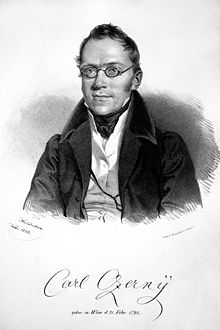 Carl Czerny (21 February
1791 - 15 July 1857)[1] was an Austrian
composer, teacher, and pianist of Czech origin whose vast musical
production amounted to over a thousand works. His books of studies for
the piano are still widely used in piano teaching.
Carl Czerny (21 February
1791 - 15 July 1857)[1] was an Austrian
composer, teacher, and pianist of Czech origin whose vast musical
production amounted to over a thousand works. His books of studies for
the piano are still widely used in piano teaching.Carl Czerny was born in Vienna (Leopoldstadt) and was baptized in St. Leopold parish.[2] His parents were of Czech origin; his mother was Moravian. His parents spoke the Czech language with him. Czerny came from a musical family: his grandfather was a violinist at Nymburk, near Prague, and his father, Wenzel, was an oboist, organist and pianist. When Czerny was six months old, his father took a job as a piano teacher at a Polish manor and the family moved to Poland, where they lived until the third partition of Poland prompted the family to return to Vienna in 1795.
A child prodigy, Czerny began playing piano at age three and composing at age seven. His first piano teacher was his father, who taught him mainly Johann Sebastian Bach, Joseph Haydn and Wolfgang Amadeus Mozart. He began performing piano recitals in his parents' home. Czerny made his first public performance in 1800 playing Mozart's Piano Concerto No. 24 in C minor.[3]
In 1801, Wenzel Krumpholz, a Czech composer and violinist, scheduled a presentation for Czerny at the home of Ludwig van Beethoven. Beethoven asked Czerny to play his 'Pathétique'' Sonata'' and ''Adelaide''. Beethoven was impressed with the 10-year-old and accepted him as a pupil.[4] Czerny remained under Beethoven's tutelage until 1804 and sporadically thereafter. He particularly admired Beethoven's facility at improvisation, his expertise at fingering, the rapidity of his scales and trills, and his restrained demeanour while performing.
Czerny's autobiography and letters give many important references to Beethoven during this period. Czerny was the first to report symptoms of Beethoven's deafness, years before the matter became public: "I also noticed with that visual quickness peculiar to children that he had cotton which seemed to have been steeped in a yellowish liquid, in his ears."
Czerny was selected by Beethoven for the premiere of the latter's Piano Concerto No. 1 in 1806 and, at the age of 21, in February 1812, Czerny gave the Vienna premiere of Beethoven's Piano Concerto No. 5, "Emperor". Czerny wrote that his musical memory enabled him to play all the Beethoven works by heart without exception and, during the years 1804–1805, he used to play these works in this manner at Karl Alois, Prince Lichnowsky's palace once or twice a week, with the Prince calling out only the desired opus numbers. Czerny maintained a relationship with Beethoven throughout his life, and also gave piano lessons to Beethoven's nephew Carl.
At the age of fifteen, Czerny began a very successful teaching career. Basing his method on the teaching of Beethoven and Muzio Clementi, Czerny taught up to twelve lessons a day in the homes of Viennese nobility.[5] His 'star' pupils included Theodor Döhler, Stephen Heller, Sigismond Thalberg, Leopoldine Blahetka and Ninette de Belleville. In 1819, the father of Franz Liszt brought his son to Czerny, who recalled: "He was a pale, sickly-looking child, who, while playing, swayed about on the stool as if drunk...His playing was...irregular, untidy, confused, and...he threw his fingers quite arbitrarily all over the keyboard. But that notwithstanding, I was astonished at the talent Nature had bestowed upon him." Liszt became Czerny's most famous pupil. He trained the child with the works of Beethoven, Clementi, Ignaz Moscheles and Johann Sebastian Bach. The Liszt family lived in the same street in Vienna as Czerny, who was so impressed by the boy that he taught him free of charge. Liszt was later to repay this confidence by introducing the music of Czerny at many of his Paris recitals. Shortly before Liszt's Vienna concert of 13 April 1823 (his final concert of that season), Czerny arranged, with some difficulty (as Beethoven increasingly disliked child prodigies) the introduction of Liszt to Beethoven. Beethoven was sufficiently impressed with the young Liszt to give him a kiss on the forehead. Liszt remained close to Czerny, and in 1852 his ''Études d'exécution transcendente'' were published with a dedication to Czerny.[6]
Czerny left Vienna only to make trips to Italy, France (in 1837, when he was assisted by Liszt) and England. After 1840, Czerny devoted himself exclusively to composition. He wrote a large number of piano solo exercises for the development of the pianistic technique (''Gradus ad Parnassum''), designed to cover from the first lessons for children up to the needs of the most advanced virtuoso.
Czerny died in Vienna at the age of 66. He never married and had no near relatives. His large fortune he willed to charities (including an institution for the deaf), his housekeeper and the Society of Friends of Music in Vienna, after making provision for the performance of a Requiem mass in his memory.

